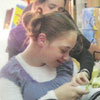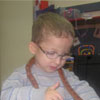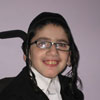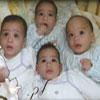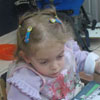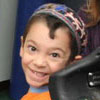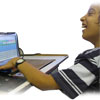Quadruple Triumphs For Tiniest Preemies
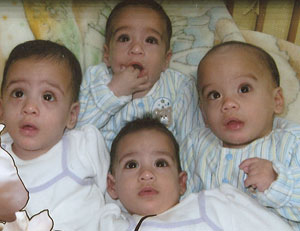 Three years ago, Mazal B. had four life and death decisions to make. Pregnant with quadruplets after years of fertility treatments and months of hospitalization, she tried to stand firm against her doctors’ constant pleas to carry out a selective reduction of the embryos. But when toxicity set in during her 27th week of pregnancy, she was rushed to an emergency caesarian to deliver four dangerously premature infants. The babies each weighed around 1-½ pounds, with conditions ranging from a brain hemorrhage to extreme oxygen deficiencies. The medical team gave them 24 hours to live.
Three years ago, Mazal B. had four life and death decisions to make. Pregnant with quadruplets after years of fertility treatments and months of hospitalization, she tried to stand firm against her doctors’ constant pleas to carry out a selective reduction of the embryos. But when toxicity set in during her 27th week of pregnancy, she was rushed to an emergency caesarian to deliver four dangerously premature infants. The babies each weighed around 1-½ pounds, with conditions ranging from a brain hemorrhage to extreme oxygen deficiencies. The medical team gave them 24 hours to live.
Against all odds, all four babies survived, yet two were stricken with cerebral palsy, and all suffered severe delays in development. “I was extremely worried about each of my precious children,” Mazal recalled. “Yet I had faith in the Almighty, who had given me four miracle children. And indeed, He performed an additional miracle by leading us to Meshi!”
Meshi’s staff will never forget the day the quadruplets arrived. “At age 1-½ years, they were all so tiny,” recalls physical therapist Atara Tarragin. “None of them walked or crawled, none could talk, none could eat solid food, and we feared cognitive impairment as well. They were four premature babies who were delayed in every realm---but perfect candidates for almost every therapy in Meshi’s multi-discipline arsenal,” she said. “We had one major advantage: the opportunity for very intensive early intervention, during that small window of opportunity before age three. We geared up to give each child a tremendous push, with a careful two-year plan of action involving the wide range of Meshi’s therapies. And today, a year-and-a-half later, they’re the most adorable, mischievous, capable kids around, who run and dance and play with friends. By next year, they’ll be able to ‘graduate’ Meshi and move on to other kindergartens.”
Very Different Rehabilitation Needs
Atara emphasizes that each child had very different rehabilitation needs. “Avital had a brain hemorrhage at birth and then sepsis, in addition to visual and hearing issues. But of greatest concern was her diagnosis of cerebral palsy. When she arrived here at age 14 months, she was crawling on her stomach, not on all fours, which made me fear that she would never walk independently. But after intensive therapy, she took her first steps here at Meshi at age 20 months. Today she doesn’t even need orthotics for her feet—she runs and jumps and loves to play.”
Brother Shimon has mild cerebral palsy and more serious speech and communication issues. Meshi’s staff has designed a program for Shimon that involves dual therapy- combining physical and speech therapy, for example. Here he practices bending, climbing and crouching while reading a book and telling a story. “This combined therapy enables integrative goals,” explains physical therapist Efrat Sela-Harf, as speech therapist Keren Grant turned the pages of Shimon’s storybook. “Together we see his abilities and work to improve them through games and fun.”
While siblings Sara and Yehudah were not diagnosed with cerebral palsy, they suffer from speech and communications deficiencies, as well as attention and sensory integration disorders. “Sara had very serious eating problems at first, and it was quite a while till she could handle solid food,” recalls her nursery teacher Batya Rakovsky. “We were also quite concerned with her inability to speak and her very low muscle tone. But we tackled each of these problems head-on, with truly amazing results. Today Sara speaks and eats well, she can walk and run, and she’s full of life. And she’s the boss of the nursery class, with lots of friends who look up to her.”
Only Quadruplets in any Israeli Rehabilitation Center
Both Sara and Yehudah—a bright, mischievous livewire who runs, not walks-have problems concentrating, sitting still, and completing games, as is often the case with such early preemies. Occupational therapist Dikla Gol explains, “We’re trying various techniques to address these concentration issues as well as their sensory integration problems. We’re making strides with a ‘sensory diet’ technique that involves brushing their skin, and other stimulants.”
To the best of the Meshi staff’s knowledge, there are few, if any other rehabilitation centers in Israel with a set of quadruplet children in tow. “It’s been fascinating to treat them,” says Batya Rakovsky. “At the start, we saw them as one unit, and they are similar in character. But gradually we got to know each child’s personality and complex physical and emotional needs. We’ve enjoyed watching how they interact, argue and protect each other. There’s a lot of love here, among toddlers who have taken such giant steps in life.”
Atara Tarragin agrees. “Even though we’ve been with these kids since Day One in Meshi, it’s nearly impossible to believe the four miracles these children really are. Thanks to Meshi’s intensive treatment for each child in physical, occupational, speech, and music therapy, they’re flourishing.” Says their mother Mazal, “I can’t ever find a way to say thank-you to Meshi. They saved my four children’s lives.”
